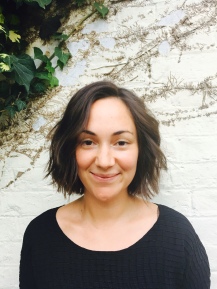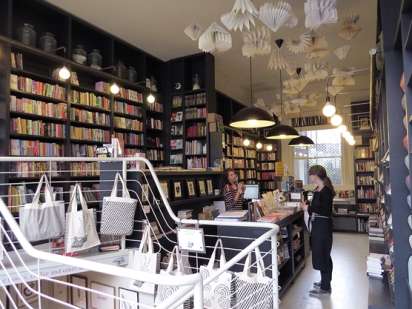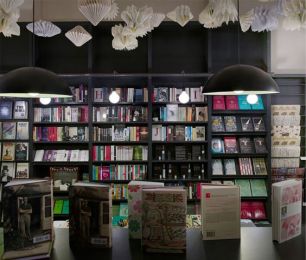
This is the second piece in a new interview series with people from the publishing industry. I’ll be asking them exactly what their jobs entail, what they like about them, and what they don’t. I’ll be interviewing editors, designers, publicists, sales people and many others. This week I’ve been speaking with Jane Finigan, a literary agent, and Partner at Lutyens & Rubinstein. The agency is based in Notting Hill, in London and represents a broad range of authors and books including fiction, non-fiction, cookery, YA and children’s. And, in the interest of full disclosure, I should say Jane is my literary agent.

Claire: You’ve been with Lutyens and Rubinstein [L&R] since 2006, and recently you’ve been made a partner. Congratulations! What does your role involve; what’s an average day like for you?
Jane: My role involves working with authors at every stage of their career, from helping to develop and shape a first draft, to negotiating a publishing deal and holding their hand through the publication process and beyond. I’m always looking for new talent and making sure I’m on top of what’s being published at the moment and who’s publishing what – I read all the time and am in regular contact with commissioning editors. It’s very difficult to describe an average day (which is one of the reasons I love my job). Some days will be spent exclusively in the office, communicating on behalf of my authors, going through contracts, pitching a book over the phone to editors. Others will be spent on the hoof, meeting with authors, editors, publicists often at the same time. But whatever my day entails, at least some part of it will be spent reading.
C: What’s the best bit about it, and the worst?
J: Luckily, I love reading. I also love people so always enjoy meeting up with authors and editors to talk about books. The worst part of my job is when I’m selling a book which several editors have offered on and it comes to letting the under-bidders know that I’ve sold it elsewhere. We’re all in this industry because we’re passionate about books and so it can be heart-breaking to lose one.
C: When writers are sending out queries to agents I know they worry excessively about their cover letter and synopsis. How important are these for you?

J: They’re both important. The cover letter because it’s the first sense I get of the author: who they are and whether we might work well together and, if it’s a good letter, it will tell me why they have approached me/L&R specifically. The synopsis because it tells me what the author thinks the book is about and how they see it. I have a slightly upside-down approach to the synopsis though as I don’t read it until after I’ve read the manuscript. This way I can form my personal opinion and vision for the book first and then see whether it agrees with the author’s own!
C: And what makes you excited when you read a submission? Is it usually a definite ‘yes’ or ‘no’, or are you sometimes undecided until you meet or talk to the author?
J: I get most excited when I forget that I’m reading a submission and it feels like I’m just devouring a book for pleasure. I can usually tell pretty quickly if it’s not for me and it’s wonderful when it’s a definite ‘yes’, but I am often torn because it’s rare to get that definite yes. A meeting with an author is unlikely to make me change my mind but it can help me get a sense of whether they’re open to working on the manuscript and whether our vision for the book is aligned in a way that makes me want to spend some time developing the book with them.
 C: So, with those ones where you’re torn, how do you make up your mind?
C: So, with those ones where you’re torn, how do you make up your mind?
J: I’ll take a bit of time to think it over and will often share with colleagues – we’re a small and very collaborative agency and we share manuscripts with each other all the time. If I think the book has enormous potential but for whatever reason isn’t quite there I will usually ask for a meeting with the author and discuss my thoughts and suggestions with them.
C: And what makes your heart sink?
J: My heart sinks when a submission is addressed ‘Dear Sirs’. It implies that the author hasn’t done even the most basic research into our agency.
C: Yes, I can never understand that. Recently I was talking with the editor of a literary journal who told me that a writer had approached her to see if he could submit some work. She encouraged him to, and although they’d been chatting beforehand, and he knew she was a woman, the submission still came through address to ‘Dear Sirs’.
Once a writer has got through those hurdles how involved do you get in editing their work before submitting it to an editor, or is each author different?
J: Each author is different. Sometimes there will be a few minor tweaks and sometimes, after sitting down with the author, we’ll attempt a much more drastic make-over. It’s a very tough market at the moment and if I can see a reason why an editor might turn a book down, it makes sense for me to help the author address that problem. But I’m not an editor and I always remind authors that there will be more editorial work to come if/when we get them a publishing deal.
C: How important is your own taste in books for the authors you choose represent?
J: I personally think it’s important because I can get most passionate about books that I really love. Luckily I have very eclectic taste which stretches across fiction and non-fiction.
C: And you must have a close relationship with editors in publishing houses who buy manuscripts from you. How does this work? Are those boozy lunches that the publishing industry was famous for, a thing of the past?
J: Staying in touch with editors is key, it’s one of the reasons authors need agents: to know exactly who is buying what, where and who will be the best pair of hands for a book in any given publishing house. I stay in touch with editors by email and phone although I do always enjoy meeting up in person, particularly if it’s an editor I haven’t met before. Those legendary boozy lunches, though not entirely extinct, are few and far between!
C: Going back a bit, how did you become a literary agent and any advice for someone wanting to become one?
J: I started working as an agent for illustrators when I left university and while I did enjoy a lot about that job, it wasn’t quite the right fit. I’d always loved reading and used to go to the Hay Literary Festival every year. One year I met Felicity Rubinstein there and when she said she was a literary agent (and told me what that actually meant!) something clicked. My first job in publishing was working as the assistant to her and Sarah Lutyens. My advice to anyone wanting to become an agent would be to read everything! Read the bestsellers as well as the classics, read across the different prize lists, form opinions and familiarise yourself with what the different imprints and publishing houses publish. But crucially, be willing to start at the bottom and work your way up. There is so much to learn from being an assistant and you will be remembered and recommended for how dedicated you are, and how willing you are to roll up your sleeves and get stuck in.
C: And one final question: Do you have any time for reading for pleasure? And what books do you love (that you don’t represent)?
J: We have an independent bookshop which I walk through every day and so it’s practically impossible for me to stop myself buying books for pleasure! Some books that I’ve loved reading for pleasure recently are All my Puny Sorrows by Miriam Toews, My Name is Lucy Barton by Elizabeth Strout and I’m really enjoying His Bloody Project by Graeme Macrae Burnet.
*
If you have any burning questions for editors, cover designers, publicists or if there is a particular role you’d like me to interview, let me know in the comments below.
Read myinterview with a Reader in a literary agency
Read my interview with a Publishing Director at Fig Tree / Penguin
Read my interview with an Art Director at Tin House
Read my interview with a Foreign Rights Agent in a literary agency
Read my interview with an Editor at Tin House
Read my interview with a Translator
*

My second novel, Swimming Lessons, will be published in January 2017 in the UK, and Canada, and February 2017 in the USA. Click on the country links to pre-order.

I’m really enjoying these interviews, Claire – thank you. I’m going to have to check out the L&R bookshop next time I’m in London.
I do have one question for an editor, and that is how multiple editors work with an author at the same time. I’ve come across a couple of authors recently who had both a US and a UK publisher buy into their work in progress and wanted it shaped to their particular market. I understand that there is usually one editor who takes the lead, but I’m intrigued as to how the whole process works. It must be very challenging.
LikeLiked by 1 person
It can be a challenge. I have a UK and US publisher from different houses and it is really up to me to decide which changes to implement and which to reject. It might work differently if they are from the same publishing house. I’m not sure. I’ll put it on my list of questions. Glad you’re enjoying the series.
LikeLike
Reblogged this on neverimitate.
LikeLike
Very interesting and helpful, particularly as I had a nibble from L & R with the submission of my last book, though they didn’t, sadly, take the manuscript.
LikeLiked by 1 person
Still, that nice to know. Thanks for reading, Hilary.
LikeLiked by 1 person
Pingback: Publishing Interviews: The Agency Reader | Claire Fuller
This is one I’ll save… wonderfully inspiring and informative, Claire.
LikeLike
Pingback: Flash Fiction: Trashish | Claire Fuller
Thanks for publishing that interview, Claire. I’ve talked to a lot of agents and never seen the messiness of the decision process described that clearly
LikeLiked by 1 person
I used to edit a journal. My unfavourite opening for cover letters was ‘Dear Sir or Madam’ & I’d usually remark in my letter of rejection, ‘If your unsure whether I’m a Sir or a Madam, I doubt that I’m very dear to you.’
LikeLiked by 1 person
Oh, I did spell ‘you’re’ correctly. Silly me!
LikeLike
Hah! A very good response.
LikeLike
Pingback: Claire Fuller interviews publishing industry experts | theprimewriters
Great series Claire! So insightful & helpful 😀
LikeLiked by 1 person
Thanks Poppy!
LikeLiked by 1 person
Great interview, Claire. Thanks so much for the information. I didn’t realize how a Literary Agent might help develop a manuscript. That’s good to know.
LikeLiked by 1 person
Glad you found it interesting Amy. I worked quite a bit with Jane on my first manuscript before she submitted it to editors.
LikeLiked by 1 person
Pingback: Publishing Interviews: The Publishing Director | Claire Fuller
Pingback: Publishing Interviews: The Art Director | Claire Fuller
Pingback: Publishing Interviews: The Foreign Rights Agent | Claire Fuller
Pingback: Publishing Interviews: The Editor | Claire Fuller
Pingback: Publishing Interviews: The Translator | Claire Fuller
Pingback: Publishing Interviews: Head of Sales | Claire Fuller
Pingback: Publishing Interviews: The Copy-editor | Claire Fuller
Pingback: Publishing Interviews: The Publicist | Claire Fuller